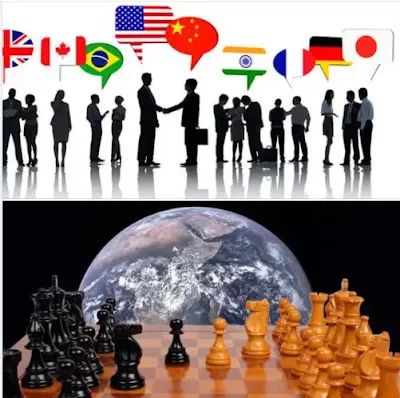Dependency Theory, International Relations, Foreign Policy, Diplomacy, Culinary Diplomacy
 |
| Dependency Theory, International Relations, Foreign Policy, Diplomacy, Culinary Diplomacy |
Suppose one of the final products made in our garments industry is jeans pants. Now to make these jeans we have to import cotton or cotton fiber from China, we have to import dyes from India to give that cotton color or shape in different colors, we have to buy sophisticated sewing machines from Germany, hire a fashion designer from Vietnam Is to come. Then the garments made have to be exported to Europe-America. Now the question is what do I mean by this simple example?
I mean, based on this garment sector alone, Bangladesh has to be dependent on many states. I mean that one state cannot function without being dependent on another. That is, interdependent. It is because of this dependence on each other that we have to establish relations with different states. Establishing this relationship with another state is called International Relations.
Thus a state has to adopt some policy or policy to establish international relations or maintain relations with different countries considering the national interest. These are the rules by which a state deals with other states in order to protect or safeguard its own interests in the international arena.
We have seen that we need Chinese cotton for the garment industry. China will not give cotton to Bangladesh just like that. To get that cotton, we have to sit at the negotiating table with China, send our representatives to China, negotiate with them on the price. Thus, fulfilling our needs from China by performing the above tasks at the field level is called Diplomacy.
Diplomats adopt various strategies to protect the national interest in the international arena. One of them is "Culinary diplomacy". A term widely discussed in the diplomatic arena. At the beginning of the twenty-first century, the term was popularized by diplomacy scholars Paul Rockwell and Sam Chappell. Culinary Diplomacy is called by two more names. Some call it Ghastrodiplomacy and some call it Food diplomacy.
This diplomacy is very useful when a head of state or representative from another country travels to your country for the purpose of establishing diplomatic relations or developing relations. Culinary's simple Bengali is culinary. That means winning their hearts by having dinner/lance/breakfast with the cultural and popular foods of your country. Or the heads of state of the two countries go to a hotel and chat and eat. Notice- (the easiest way to win hearts and minds is through the stomach)
Peru, United States, Australia, Taiwan, South Korea, Malaysia, Japan, Thailand, Uzbekistan, etc. are the countries that use this diplomacy the most.
I used the slant 'nitty-gritty' as the heading of the post. Many may not know what it means. It means knowing the practical details or the basics or details of something. Summing up today's post, it is seen that I have learned a total of five basic things of international politics.
1. Dependency Theory
2. International Relations
3. Foreign Policy
4. Diplomacy
5. Culinary Diplomacy